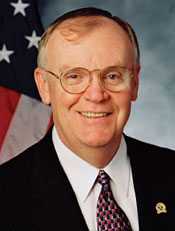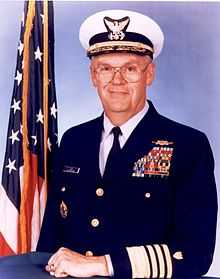James Loy
| James M. Loy | |
|---|---|
 | |
| 2nd United States Deputy Secretary of Homeland Security | |
| In office December 4, 2003 – March 1, 2005 | |
| President | George W. Bush |
| Preceded by | Gordon R. England |
| Succeeded by | Michael P. Jackson |
| Acting United States Secretary of Homeland Security | |
| In office February 1, 2005 – February 15, 2005 | |
| President | George W. Bush |
| Preceded by | Tom Ridge |
| Succeeded by | Michael Chertoff |
| Commandant of the Coast Guard | |
| In office 1998–2002 | |
| Preceded by | Robert E. Kramek |
| Succeeded by | Thomas H. Collins |
| Personal details | |
| Born | August 10, 1942 |
| Alma mater | United States Coast Guard Academy Wesleyan University |
| Military service | |
| Service/branch | United States Coast Guard |
| Rank | Admiral |
Admiral James Milton Loy (born August 10, 1942) served as Acting United States Secretary of Homeland Security in 2005 and United States Deputy Secretary of Homeland Security (DHS) from December 4, 2003, to March 1, 2005. Prior to his appointment as Deputy Secretary, he served as the second administrator of the Transportation Security Administration from 2002 to 2003,[1][2] and before that as the Commandant of the Coast Guard from 1998 to 2002.
Life and career
Born in Altoona, Pennsylvania, Loy earned the rank of Eagle Scout in the Boy Scouts of America as a youth and was awarded the Distinguished Eagle Scout Award as an adult.[3] Loy entered the United States Coast Guard Academy in 1960. Subsequently, he earned a masters degree in history and government from Wesleyan University. He served as a commissioned officer in the U.S. Coast Guard, served in combat as commanding officer of a patrol boat in Vietnam, and eventually rose to the rank of Admiral. In May 1998, Loy became the twenty first Commandant of the Coast Guard, serving in that post until 2002.[4]

As Commandant, Loy reacted to the terrorist attacks of 9/11. In the short term, he supervised the resumption of sea-borne trade throughout the US, after the USCG had shut down most major ports after the attacks. In the long term, ADM Loy led the US delegation to the International Maritime Organization (IMO), and was instrumental in ensuring that the International Ship and Port Facility Security Code was approved and implemented in 2002. The code came into effect in 2004.
In May, 2002, Secretary of the U.S. Department of Transportation Norman Mineta appointed Loy to become the Deputy Undersecretary for the newly formed Transportation Security Administration. Loy led the agency through its creation and subsequent incorporation into the Department of Homeland Security.
On October 23, 2003, Loy was nominated as Deputy Secretary of Homeland Security by President George W. Bush, and sworn in on December 4, 2003. Following the departure of Tom Ridge, Loy filled in as Acting Secretary of Homeland Security from February 1, 2005, until February 15, 2005, when Michael Chertoff was confirmed and sworn into office. Joining the exodus of leadership, Loy resigned as Deputy Secretary, effective March 1, 2005.
As noted in Loy's biography published by the United States Coast Guard:
He has received the Department of Transportation Distinguished Service Medal, four Coast Guard Distinguished Service Medals, the Defense Superior Service Medal, two Legion of Merit awards, the Bronze Star with Combat “V,” the Meritorious Service Medal, five Coast Guard Commendation Medals, the Coast Guard Achievement Medal, the Combat Action Ribbon, and other unit and campaign awards.[5]
On April 7, 2005, the Cohen Group announced that Loy had joined the firm as a Senior Counselor, effective April 18.[6]
On August 5, 2005, Loy joined the Board of Directors for Lockheed Martin.
Before his retirement from the Department of Homeland Security, Loy enacted a series of requirements for Merchant Mariners which were supposedly created to "streamline" the transportation worker's identification process. This process is overseen by the Transportation Security Administration (TSA). In the new system, workers who had previously received a Merchant Mariner's Document (MMD), which served as both an ID and a credential, now had to acquire two separate documents, a Merchant Mariner's Credential (MMC), and a Transportation Worker's Identification Credential (TWIC). Loy's system, designed to "streamline" the process, has not proven very effective and is a source of discontent among transportation workers. The TWIC card, the ID component for workers, is rarely accepted as a legitimate form of identification, despite its being a government issued ID. And the MMC, which outlines a workers credentials in his or her industry, is a cumbersome document not meant to be carried as an ID. The result is an inefficient system.[7]
In the Fall of 2006 it was announced that ADM Loy was being honored as the first Chair of the Tyler Institute for Leadership at the US Coast Guard Academy. As such Admiral Loy has played a significant role in speaking and drawing other distinguished visitors to the Academy. His first class was designed to teach a select group of cadets about the international shipping industry and how it might be secured.
In March 2007 the Washington Post had a feature on Admiral Loy and his relation to the Coast Guard's Deepwater contract, which was awarded to Lockheed Martin in summer of 2002. When asked by the Washington Post if he ever faced improper influence on Deepwater decisions while serving as Commandant, Loy said: "The question is almost insulting. I will pass on giving you any kind of answer."[8]
See also
References
- ↑ http://www.pnsr.org/web/page/832/sectionid/578/pagelevel/4/interior.asp
- ↑ http://www.marinelog.com/DOCS/NEWSMMIII/MMIIIOct24.html
- ↑ "Distinguished Eagle Scouts". Scouting.org. Retrieved 2010-11-04.
- ↑ United States Coast Guard Biography
- ↑ http://www.uscg.mil/history/Loy/jmloy_bio.asp
- ↑ Cohen Group
- ↑ http://www.tsa.gov/what_we_do/layers/twic/twic_faqs2.shtm#twic_cost
- ↑ Washington Post article
External links
| Military offices | ||
|---|---|---|
| Preceded by Robert E. Kramek |
Commandant of the Coast Guard 1998—2002 |
Succeeded by Thomas H. Collins |
| Political offices | ||
| Preceded by Gordon R. England |
United States Deputy Secretary of Homeland Security December 4, 2003 – March 1, 2005 |
Succeeded by Michael P. Jackson |